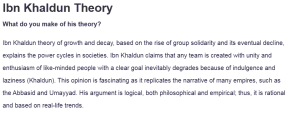Ibn Khaldun Theory
What do you make of his theory?
Ibn Khaldun theory of growth and decay, based on the rise of group solidarity and its eventual decline, explains the power cycles in societies. Ibn Khaldun claims that any team is created with unity and enthusiasm of like-minded people with a clear goal inevitably degrades because of indulgence and laziness (Khaldun). This opinion is fascinating as it replicates the narrative of many empires, such as the Abbasid and Umayyad. His argument is logical, both philosophical and empirical; thus, it is rational and based on real-life trends.
Does it seem reasonable and supported by historical evidence?
The theory is well-founded in historical evidence, especially in the collapsing of dynastic and empire states from the point of highly united and commanded rule by a strong leader. The Roman Empire’s fall, often attributed to internal decay and overextension, aligns with Ibn Khaldun’s observations. As such, his approach to linking these cycles to people’s behavior and social phenomena is credible. Nevertheless, his framework may not be adequate for chaotic, aperiodic shocks, such as invasions or plagues, which also shape history.
Parallels in business history, art history, and other realms outside politics
In the history of business, business ventures pass through a similar life cycle; initial inspiration and cohesiveness are replaced with inertia, as can be evidenced by the case of Kodak, which failed to embrace the shift to the digital era. In art history, movements like the Renaissance depend on the passion of many people but wither when patronage is reduced, or imagination dies out. The same goes for scientific revolutions, when some fundamental discovery is made, and people work for some time on a corresponding model without getting anywhere, up to the moment when a new revolution starts. The versatility of Ibn Khaldun’s is demonstrated in other fields, which shows its relevance.
Works Cited
Khaldun, Ibn. The Muqaddimah–An Introduction to History. 1967.
ORDER A PLAGIARISM-FREE PAPER HERE
We’ll write everything from scratch
Question 
Growth Decay
To prepare for this discussion, I want you to read the selected passages of Ibn Khaldun’s Muqaddimah (Chapter 2, Sections 14 and 15). In these sections, the historian provides a general theory of history about why clans, states, governments, etc. rise and fall over time.

Ibn Khaldun Theory
What do you make of his theory? Does it seem reasonable and/or supported by historical evidence? Do you see parallels in business history, art history, or other realms outside of politics? Does a “general theory” of history make sense? Is human history a series of cycles, or a randomly generated landscape?
Feel free to address any (not all) of these questions in your post, but also please make it clear that you have read and understood Ibn Khaldun’s “general theory.” Or, ask questions if you don’t understand!